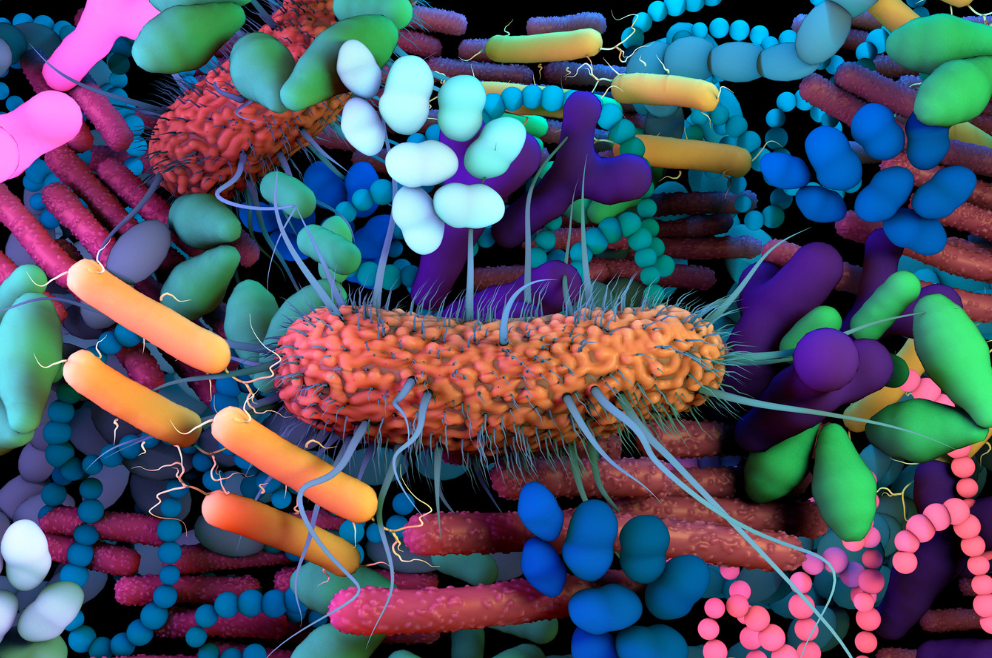The Microbial World
In the sessionEmerging Applications of the Microbiome for Human Health,keynote speaker Sarah Allard Ph.D., Assistant Project Scientist at Gilbert Lab, put the huge scope of the topic in context by noting, “There are more microbes on earth than stars in the known galaxy." Dr. Allard explained that there is an ecological connection between microbes and the environment, and she highlighted how the health of our environment is interconnected to the health of humans. Dr. Allard discussed work being done at Gilbert Lab on this front, including research into how elevated temperature may enhance pathogen uptake and colonization, and how exposure to microplastics can impact host health and may allow for more effective pathogen colonization.Another key point addressed by Dr. Allard: the need to a precision approach. “Each person has a unique microbiome,” Dr. Allard explained, noting that even identical twins have varying microbiomes. The ways in which we interact with the world affect the bacteria that colonize in our guts, giving us each a unique profile. Impacting factors include drugs, geography, aging, environment, diet, exercise, and disease.
Dr. Allard noted that emerging applications of the microbiome for human health include the development of microbial diagnostics to predict disease and complications before they occur. She explained that identifying biomarkers is useful when looking at large data. “Biomarkers are microbial signals that provide clinically relevant information.” She also discussed how adding a microbial component to diagnostic tools may promote earlier diagnosis of disease in the future or help with less invasive procedures for diagnostics. This could allow for better and earlier diagnoses for diseases like cancer.
Additionally: “Drug response is connected to the microbiome,” said Dr. Allard. “As the same drug in different patients can be metabolized differently, microbes could be supplemented to help our bodies process those drugs as intended.” She also delved into treatment through the wider-known fecal microbiome transplants to help a patient recover from illness. And that's just a sneak peak at the full session, which can beviewed on demand.
New Findings and Benefits
Throughout the day, speakers including Michael Lelah, Ph.D., of CSO NutriScience Innovations; Carolyn Slupsky, Ph.D., Professor University of California; Deepak Mundkinajeddu, Ph.D., Head of R&D at Natural Remedies Limited; and Hariom Yadav, Ph.D., Director at the USF Center for Microbiome Research, Microbiomes Institute, covered key topics related to the microbiome market. The session covered functional foods, branded ingredients, and research relating to gut bacteria.Next Generation Prebiotics
InNext Generation Prebiotics- Direct Butyrate Generators,Dr. Lelah spoke about the active compound butyrate and its ability to cross the blood-brain barrier, benefit mood and sleep, and effect appetite and eating behavior. He reported on research showing its impact on stimulating immune cell activation, reducing oxidative stress, and more, and discussed opportunities for exercise and metabolism applications.Functional Foods
InThe Functional Foods, the Gut Microbiome and Health, Dr. Slupsky presented research showing that nopal cactus has high-level gut benefits and improves microbiome diversity. “Nopal is a functional food,” said Dr. Slupsky, “and has been used to improve the gut barrier function, increase luminal mucin production, bind lipids and bile acids, and systemically lower cholesterol and improve insulin sensitivity.”Probiotics for Synergistic Benefits
Dr. Mundkinajeddu presented how licorice extract was studied and shown to be beneficial in mitigating gut health symptoms like bloating and nausea (functional dyspepsia). He discussed the branded ingredient GutGard and its specific benefits, including research showing a “51% reduction in the total symptoms compared to placebo by consuming flavonoid extract."Gut-Brain Axis & Nutraceuticals
Day one concluded with insights from Dr. Yadav about aging and the brain-gut axis. He pointed to an animal study comparing younger and older mice: “The older mouse studied showed reduced mucin and mucus that were thinner, therefore leading to more inflammation and ultimately higher cognitive decline.” The animal research also linked an older microbiome to more leaky gut due to the reduction of mucus thickness. He noted that probiotics and postbiotics may help reduce aging-related leaky gut and inflammation, and may improve mental health in elderly populations.
All sessions are now available to view on demand withfree registration here. This event was sponsored byAIDP,ClearCut Analytics and SPINS,Enzymedica,NutriScienceandStratum Nutrition,who made this event free thanks to their sponsorships.








